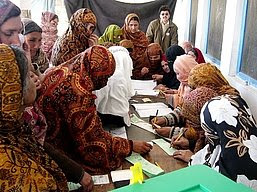 One of my friends, Josh White, just got back from working as an election monitor in the Pakistan. He shares some thoughts and observations in an op-ed in today's Wall Street Journal:
One of my friends, Josh White, just got back from working as an election monitor in the Pakistan. He shares some thoughts and observations in an op-ed in today's Wall Street Journal:The ouster of pro-Taliban Islamist parties in Pakistan's Northwest Frontier Province has sparked optimism that secular nationalism is replacing religious fanaticism in a troubled corner of the world. But the election results are best viewed as another phase in Pakistan's cyclical politics rather than a revolution in attitudes about Islamic governance. The United States, taking the long view, would be wise to engage both the winners and the losers in the province's new political order. The losers are likely to wield influence in the region again.
The key to dealing with the religious parties is to continue their integration into the mainstream political process. The good news here is that "democratic Islamists" like the MMA were never quite as dangerous as prophesied. Faced with the stark realities of governance, they watered down their Shariah agenda, crafted a development program that bent to the wishes of international donors, and began more forcefully to disassociate themselves from militancy.
No one should have any illusions: Islamist discourse and strict Shariah are corrupting to liberal democracy in Pakistan. But the democratic Islamists are not a monolith. They adapt, they compromise, and they absorb a vast pool of young activists who might otherwise turn toward violence. Left alone on the margins, they may more readily adopt a vigorous politics of agitation, protesting progressive social policies and state action against hardline clerics.
This is a particular threat because, despite the MMA's defeat, the broader political winds are still at its back. Anti-Americanism and frustration with the war in Afghanistan remain high. Furthermore, the ANP's secular and pro-Hamid Karzai orientations -- both of which are out of step with the broader Pashtun population in the Frontier -- are likely to limit its influence in precisely those places that present the greatest governance and security challenges to the Pakistani state.
This election was not so definitive a rejection of religious politics as it might seem. The religious parties are not going away, and now more than ever the U.S. must learn to engage with the entire spectrum of religious and political actors in the Frontier. Sometimes it's the losers who matter most of all.
Read the whole thing.
Josh is currently a graduate student at Johns Hopkins School of Advanced International Studies. He lived in Peshawar for 10 months in 2005-2006 and spent time studying at Lahore University of Management Science (where Ali went to school).
I attended a presentation Josh gave last November on his work on Pakistan's North-West Frontier Provence and was quite impressed. Almost without exception, all the commenters and questioners said it was the best, most comprehensive presentation they’ve ever seen on the subject. You can listen to his presentation and the following discussion.
P.S. -- Ali reacts.

No comments:
Post a Comment